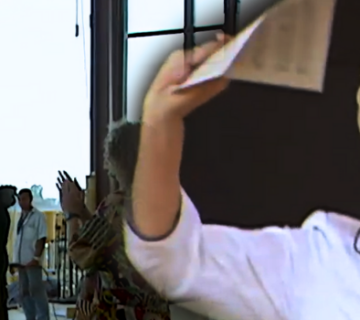The coronavirus pandemic is a trial by fire not only for healthcare systems but also for those engaged in politics, both locally and internationally. The following excerpt from a speech by Chiara Lubich can justifiably be called a “hymn to politics”. It is a challenge for politicians and can fill the hearts of ordinary citizens with gratitude towards all those who have to make courageous decisions on a daily basis.
While most of the new movements take an active interest in all that is happening in the world, one of them, the Focolare Movement, has actually given rise to a political section known as the Politics for Unity Movement. Its specific aim is precisely that of promoting fraternity in politics. …
First of all, we realized that a true vocation to politics exists. Believers discern the voice of God entrusting them with this task. People without formal faith also feel called to politics when, for example, they see social needs or groups of vulnerable people asking for help.
Responding to the call to enter politics is, above all, an act of fraternity. In fact, people become politically active in order to work for issues that concern the general public, to help other people, wanting their good as if it were their own.
In reality, the task of love in politics is to create and safeguard the conditions that enable all other types of love to blossom: the love of young people who want to get married and who need a house and jobs; the love of those who want to study and who need schools and books; the love of those who have their own business and who need roads and railways, and clear and reliable rules…. Hence politics is the love of all loves, fostering collaboration among people, bringing together needs and resources, and enabling people to trust one another.
Politics can be compared to the stem of a flower that supports and nourishes the renewed blossoming of petals in the community.
In the Politics for Unity Movement, we notice that, by living out our political choices as a vocation to love, we understand that other people, who have made political choices different from our own, can be motivated by a similar vocation to love. They, too, in their own way, are part of the same design, even when they become our political opponents. Fraternity enables us to recognize their task, to respect it and help them to be faithful to it – also through constructive criticism – while we remain faithful to our own.
In the Politics for Unity Movement, we believe that we should live fraternity so well as to reach the point of loving the other person’s party as we love our own. We know that neither party was born by chance, but that each was the response to an historical need within the national community. Fraternity brings out the authentic values of each side and reconnects the whole tapestry of the political design of a nation.
The initiatives of the members of the Politics for Unity Movement bear witness to this. They seek to create a fraternal relationship between the majority and the opposition, both on the level of the national Parliament and in municipal authorities. Their initiatives have been formulated into laws on a national level, or into local policies that have brought greater unity to the towns and cities where they were applied.
Thus, those who respond to their political vocation by beginning to live fraternity, enter into a universal dimension that opens them up to the whole of humanity. They ask themselves whether the decisions they are about to make, while serving the interests of their own nation, might be detrimental to others. Politicians of unity love other people’s countries as their own.
Chiara Lubich
From Chiara Lubich, “A United Europe for a united world”. Speech given to the European Movement, Madrid (Spain), 3rd December 2002


 Italiano
Italiano Español
Español Français
Français Português
Português




Infelizmente em 2020 com a covide parou o mundo e
mudou a vida também da população. Obrigado pela
informação estou compartilhando no meu twitter, pois o
artigo é útil para todos.